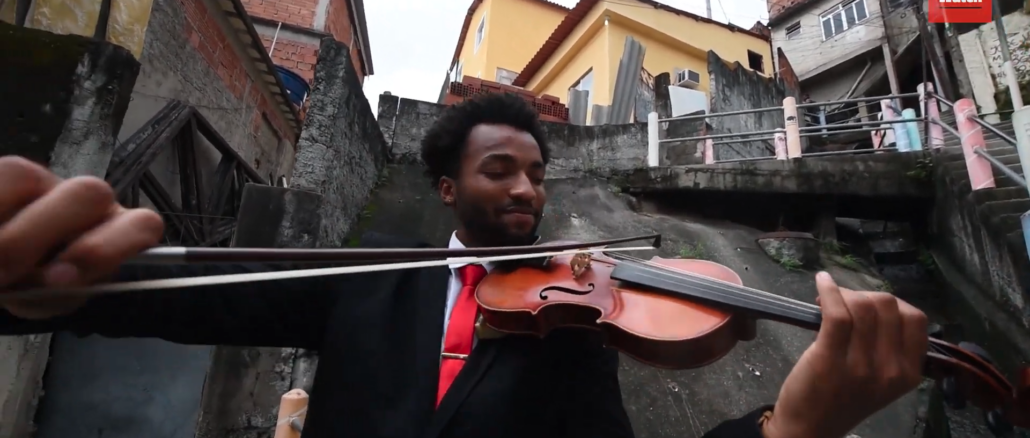This English subtitled mini-documentary is the latest contribution to our year-long reporting project, “Rooting Anti-Racism in the Favelas: Deconstructing Social Narratives About Racism in Rio de Janeiro.”
This mini-doc tells an inspiring story. Gilbert Vilela, a young black man from Morro da Providência, Brazil’s original favela, has been using music as a powerful instrument for change, social inclusion and the rescue of identity. His journey involves shifting paradigms and occupying a space historically reserved for the elite: classical music. A member of the Rio de Janeiro Youth Chamber Orchestra and Rio Youth Symphony Orchestra, Gilbert has traveled across Brazil and internationally thanks to his music, including a visit to the United Nations in Switzerland.
Believing that music is the practice of freedom, the violinist communicates what he experiences as a favela resident through his instrument and shares with others the knowledge he has acquired over the years. Currently working as an educator for the Roda Viva social project, he shows children and teenagers from Complexo do Borel and surrounding areas how music can support their development. Gilbert materializes the concept of representation and serves as an inspiration for other Afro-Brazilians and favela residents, who also have the right to dream.
The narrative is not Gilbert’s alone. The violinist’s mother, Maria Irene Belizário, and grandmother, Dona Jura, both responsible for raising him, also share their stories, through heartwarming accounts. In addition to the family, music teacher Simone Carvalho addresses the elitist context in which classical music is inserted, and speaks about the popular knowledge that contributed, and still contributes, to this musical genre in Brazil.
Watch the mini-doc with English subtitles above or here.
About the producer: Victória Henrique is a reporter with community newspaper Voz das Comunidades, currently studying Journalism at the Fluminense Federal University (UFF). She has collaborated with Notícia Preta, an anti-racist journalism portal, and produced and presented a Mídia Ninja education program on YouTube, in addition to being a columnist for the outlet. Among the projects she took on at UFF, Henrique worked as a photography instructor at a Morro da Providência favela cultural center.
About the director of photography: Douglas Dobby was born and raised in Morro da Providência. A photographer, Dobby studied at Spectaculu – School of Art and Technology in 2012. He is currently audiovisual coordinator of Casa Amarela Cultural Center, in Providência, where he studied under photographer Maurício Hora.
This English subtitled mini-documentary is the latest contribution to our year-long reporting project, “Rooting Anti-Racism in the Favelas: Deconstructing Social Narratives About Racism in Rio de Janeiro.”

